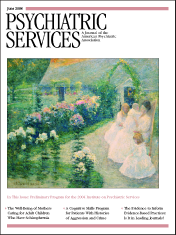Psychiatrists' Attitudes About and Informed Consent Practices for Antipsychotics and Tardive Dyskinesia
Abstract
This study provided representative data about the attitudes and behaviors of psychiatrists with respect to obtaining informed consent for antipsychotic medications. A cross-sectional representative survey of 617 psychiatrists, stratified by age and gender, was conducted by using a self-report questionnaire. The response rate was 72 percent (N=427). Demographic characteristics did not correlate with whether the respondents disclosed information about the potential side effect of tardive dyskinesia, which is associated with antipsychotic medications. Respondents' attitudes toward informed consent were a strong predictor of whether they disclosed information about antipsychotic medications and the risk of tardive dyskinesia. A total of 263 respondents (78 percent) routinely disclosed information about tardive dyskinesia.



